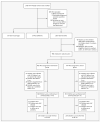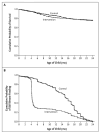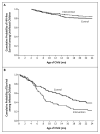Effects of early, abrupt weaning on HIV-free survival of children in Zambia
- PMID: 18525036
- PMCID: PMC2577610
- DOI: 10.1056/NEJMoa073788
Effects of early, abrupt weaning on HIV-free survival of children in Zambia
Erratum in
- N Engl J Med. 2008 Oct 23;359(17):1859
Abstract
Background: In low-resource settings, many programs recommend that women who are infected with the human immunodeficiency virus (HIV) stop breast-feeding early. We conducted a randomized trial to evaluate whether abrupt weaning at 4 months as compared with the standard practice has a net benefit for HIV-free survival of children.
Methods: We enrolled 958 HIV-infected women and their infants in Lusaka, Zambia. All the women planned to breast-feed exclusively to 4 months; 481 were randomly assigned to a counseling program that encouraged abrupt weaning at 4 months, and 477 to a program that encouraged continued breast-feeding for as long as the women chose. The primary outcome was either HIV infection or death of the child by 24 months.
Results: In the intervention group, 69.0% of the mothers stopped breast-feeding at 5 months or earlier; 68.8% of these women reported the completion of weaning in less than 2 days. In the control group, the median duration of breast-feeding was 16 months. In the overall cohort, there was no significant difference between the groups in the rate of HIV-free survival among the children; 68.4% and 64.0% survived to 24 months without HIV infection in the intervention and control groups, respectively (P=0.13). Among infants who were still being breast-fed and were not infected with HIV at 4 months, there was no significant difference between the groups in HIV-free survival at 24 months (83.9% and 80.7% in the intervention and control groups, respectively; P=0.27). Children who were infected with HIV by 4 months had a higher mortality by 24 months if they had been assigned to the intervention group than if they had been assigned to the control group (73.6% vs. 54.8%, P=0.007).
Conclusions: Early, abrupt cessation of breast-feeding by HIV-infected women in a low-resource setting, such as Lusaka, Zambia, does not improve the rate of HIV-free survival among children born to HIV-infected mothers and is harmful to HIV-infected infants.(ClinicalTrials.gov number, NCT00310726.)
2008 Massachusetts Medical Society
Conflict of interest statement
No potential conflict of interest relevant to this article was reported.
Figures



Comment in
-
Breast-feeding, antiretroviral prophylaxis, and HIV.N Engl J Med. 2008 Jul 10;359(2):189-91. doi: 10.1056/NEJMe0803991. Epub 2008 Jun 4. N Engl J Med. 2008. PMID: 18525037 No abstract available.
-
Antiretroviral prophylaxis to reduce breast-milk HIV-1 transmission.N Engl J Med. 2008 Oct 23;359(17):1845; author reply 1846-8. doi: 10.1056/NEJMc081666. N Engl J Med. 2008. PMID: 18946073 No abstract available.
-
Early, abrupt weaning did not reduce risk of HIV infection or mortality in breast-fed infants of mothers with HIV.Evid Based Med. 2008 Dec;13(6):182. doi: 10.1136/ebm.13.6.182. Evid Based Med. 2008. PMID: 19043040 No abstract available.
References
-
- Humphrey J, Iliff P. Is breast not best? Feeding babies born to HIV-positive mothers: bringing balance to a complex issue. Nutr Rev. 2001;59:119–27. - PubMed
-
- Wilfert CM, Fowler MG. Balancing maternal and infant benefits and the consequences of breast-feeding in the developing world during the era of HIV infection. J Infect Dis. 2006;195:165–7. - PubMed
-
- Kourtis AP, Butera S, Ibegbu C, Beled L, Duerr A. Breast milk and HIV-1: vector of transmission or vehicle of protection? Lancet Infect Dis. 2003;3:786–93. - PubMed
-
- Bulterys M, Fowler MG, Van Rompay KK, Kourtis AP. Prevention of mother-to-child transmission of HIV-1 through breast-feeding: past, present, and future. J Infect Dis. 2004;189:2149–53. - PubMed
-
- Ekpini ER, Wiktor SZ, Satten GA, et al. Late postnatal mother-to-child transmission of HIV-1 in Abidjan, Cote d'Ivoire. Lancet. 1997;349:1054–9. - PubMed
Publication types
MeSH terms
Substances
Associated data
Grants and funding
LinkOut - more resources
Full Text Sources
Other Literature Sources
Medical
